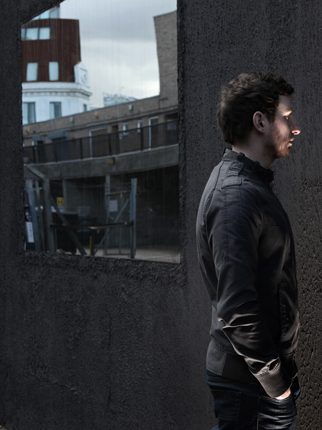Max Cooper Goes All Night Long
When it comes to techno, there are DJs, there are producers, and there are innovators. UK producer Max Cooper happens to be all three, and he has raised the bar yet again. Working with a collection of visual artists, musicians, tech specialists, and a mathematician, he has generated a unique audiovisual experience called Emergence. Projected 3D models, motion graphics, constellations, urban geography, and human biology are just a few of the tools used illustrate the story of humanity’s emergent existence, combined with a synergistic musical score.

According to Cooper, who has a background in computational biology and genetics, “Simple laws can yield beauty and complexity through emergence.” To spread this clear, albeit complex message, he’s taken the Emergence experience on tour.
We recently caught up with Cooper, who’s in the midst of closing out an 11-date North American and Central American tour, and talked his Emergence project, jet-setting, and the freedom of an all-night set.
You’re just at the tail-end of your North American tour. Are all your sets different on tour? Do you have everything preplanned?
I have different track selections city by city, event by event, country by country. I don’t preplan anything; I do a mixture of things. The main show, Emergence, is a live visual show where I play the visuals and the music. Every track is a different chapter in the storyline, but that one is a bit more restrictive because there are only so many visuals and so many live tracks to fit together.
Most of the shows I am doing on this tour are DJ/live hybrid sets. I’ll set up Ableton Live and controllers and have access to my stems, but also, I will be mixing in and out of CDJs with USBs. Several of the sets are all-night-long sets where I am playing five to six hours, delving right through all my different musical interests—from ambient, post-classical, electronica, house, techno, drum & bass, glitch, and my back catalog—and spending hours goingthrough different styles and just having fun with a lot of different music.
You get really lost in it; it’s like being in some weird alternate dimension where time ceases to have its normal values. I struggle with short sets; I don’t want to restrict myself creatively.
You operate in that space between the dancefloor and artistic sound design. How do you manage to walk that tightrope?
All I am doing, really, is what I’m into; I just try to follow my passions. I enjoy club music and dance music, and I also love sound design and experimentation and psychoacoustics and surround sound. I put a lot of work into psychoacoustics and try to create the impression of a space in the music and the sounds so you feel like you are immersed in this unusual, three-dimensional space.
I often do surround sound shows with loads of speakers around the room, where you can immerse people in sound that way. I have my interests, and I know what I like and what I don’t like. I just roll with it, and I don’t worry too much about where it’s gonna fit or who’s gonna like it and who’s not gonna like it. That sort of thing comes naturally.
You are often considered to be “uncompromising” and very individual in your pursuit, yet you have an AV show called Emergence that was the product of your collaboration with other musicians, visual artists and tech specialists. Do you consider yourself uncompromising?
The art of DJing is all about compromise. I was a DJ for a long time before I ever started writing music. When I am DJing, I am always trying to find what it is that people want most and what I want most, and compromise and balance the different factions. In terms of my productions, that’s where I get to be a bit freer and not necessarily compromise.
A lot of times, I’ll set out to do what I want to do without any consideration for where it’s gonna work and who’s gonna like it. That’s why I end up writing tracks which I can’t necessarily play in the clubs. My sets are always about the balance. I try to sneak in the weird ambient bits and the glitch and bring in the sound design stuff and the weird experiments in the context of something that works in whatever environment I’m in.
Biological origins and ancestry are common themes in your work. Is this a direct extension of your own work as a researcher, or does this go back even further?
I studied science for a long time, and it was my job doing research. That idea of emergence—particularly as applied to that universe timeline and the emergence of matter and the physical universe and, eventually, life—is so fundamental to all of science that anyone who is interested in science will be interested in that story.
Indirectly, it was always an interest, but it only really came together in this format when I started thinking about doing a visual show. The idea kept ballooning. Now I am doing an album as well, and I am going to release it as a DVD in like a full-length movie format.
Do you have any advice for aspiring DJs and producers?
Try and find what it is that you love musically, and try to express yourself; do not worry too much about what is cool and what’s not cool, or what’s right or wrong. The people who are successful are the ones that do things differently and break the rules. If you are doing really standard formats, it’s quite hard to get noticed. Everyone’s an individual; every person is different. If you can find what it is that makes you different, what you like and don’t like, and put that into your music, then it’s a good way forward.
Chris Alker is a regular all-nighter. Follow him on Twitter.
Follow Max Cooper on Facebook | Twitter


